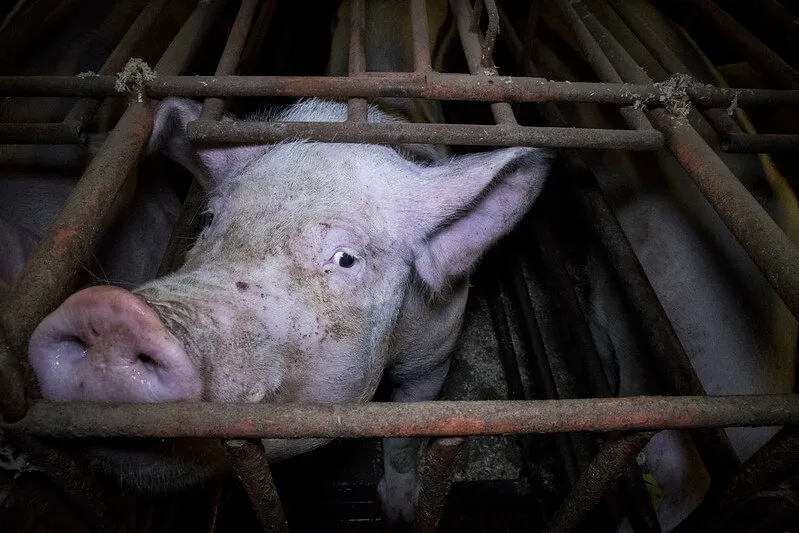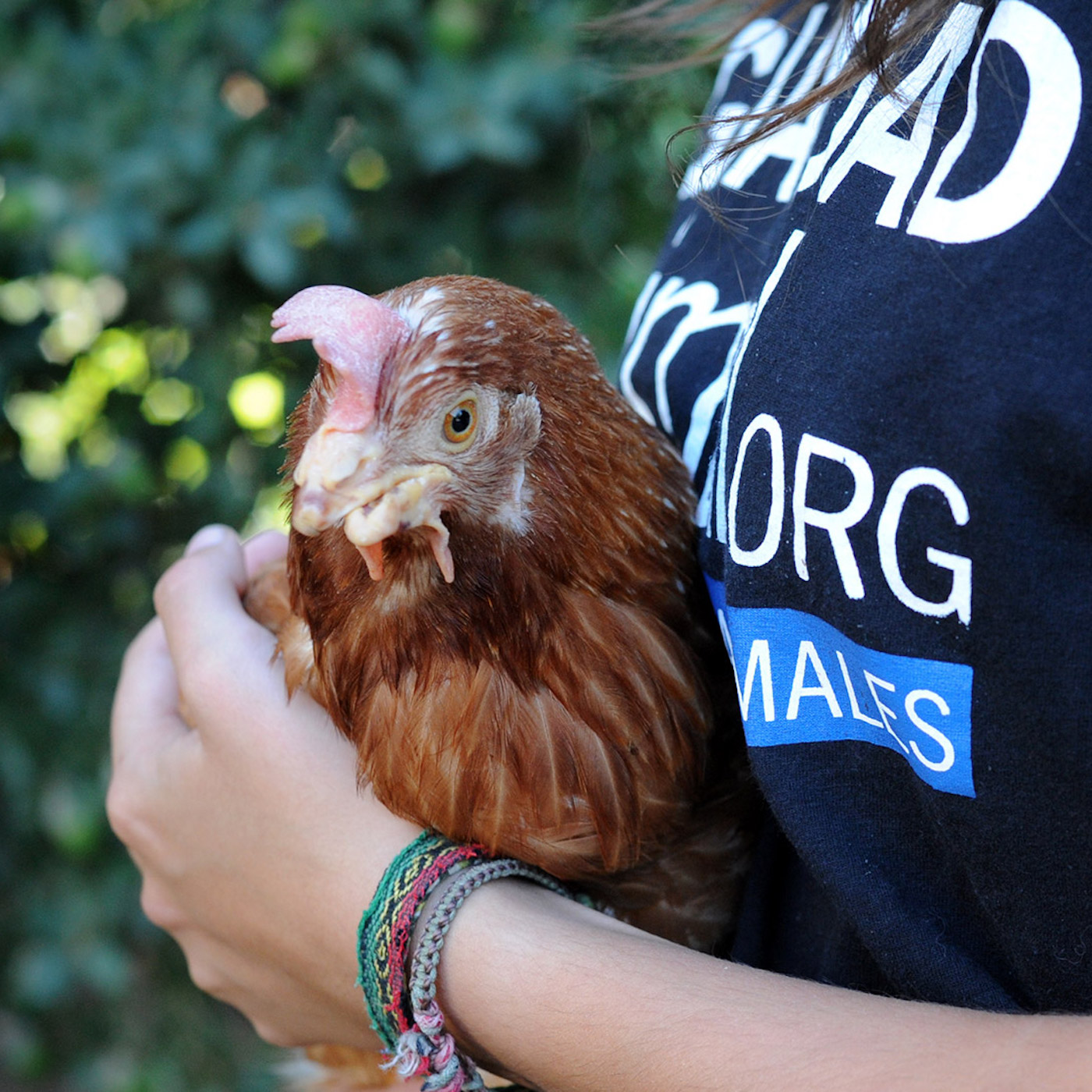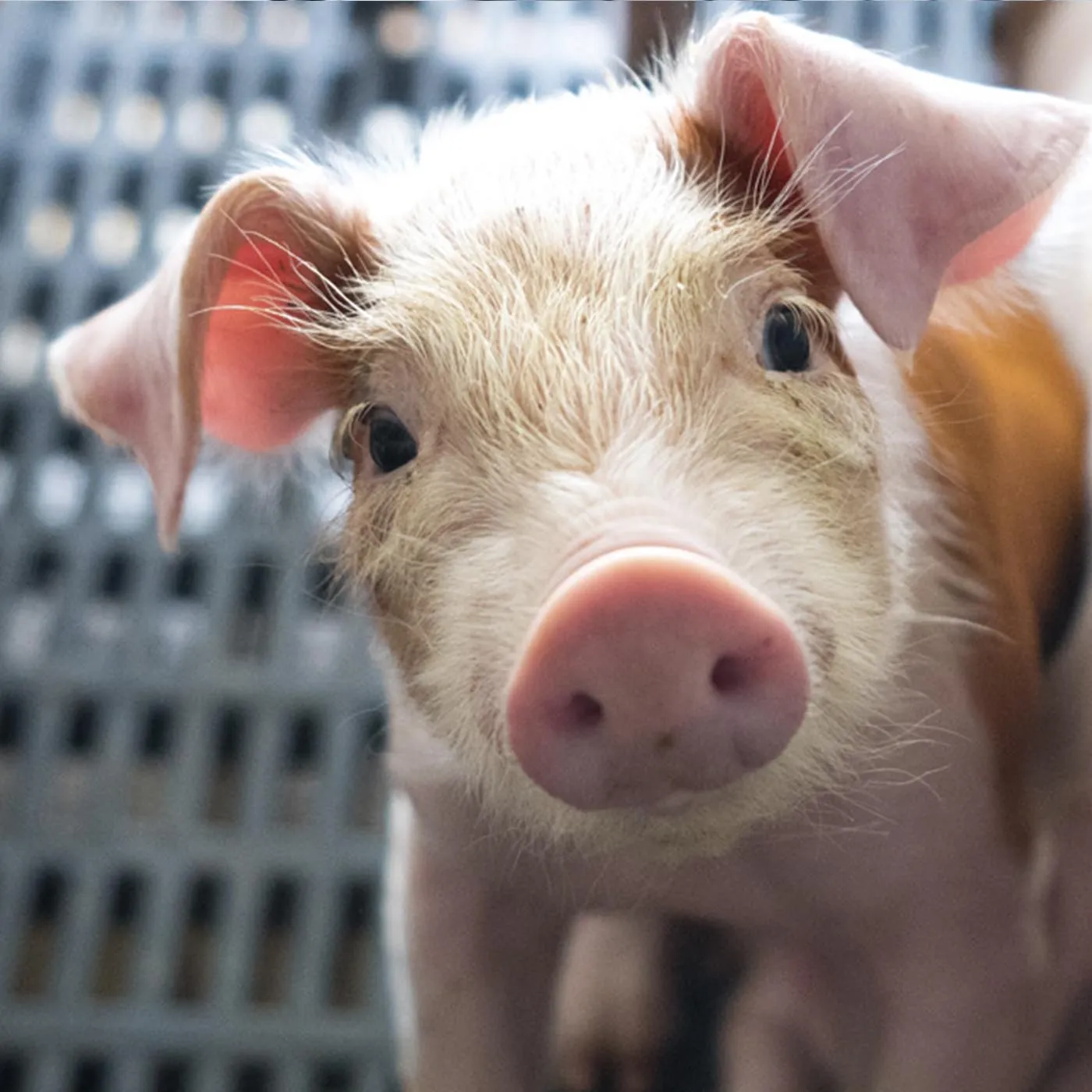The Red Tractor label: what does it really mean?
Most people will never see inside a farm or slaughterhouse, so when they have concerns about how animals are treated in order to produce the products they buy, they put their trust in others to tell them what is happening on those farms.
For most consumers, this means putting trust in an assurance scheme. These are organisations that claim to carefully monitor where our food comes from and tell consumers through food labelling that, as Red Tractor puts on its website, ‘the food you buy has been responsibly sourced, safely produced and comes from crops and animals that have been well cared for’.
But what does ‘well cared for’ mean? When consumers see the Red Tractor logo on a product they buy, are they purchasing what they think they are purchasing?
What Red Tractor allows
When consumers read that animals are well cared for, it is unlikely they are imagining piglets having their tails cut off or teeth cut down without pain relief, or mother pigs being confined in tiny metal crates for weeks on end with too little space to even turn around or nuzzle their newborn piglets, but these practices are permitted under the Red Tractor scheme.
Although Red Tractor claims that its standards are ‘world-leading’, they actually offer little above the legal minimum standards required by the Government.
One example is the stocking density allowed for chickens reared for their flesh, which is essentially how much space each chicken is given.
Under UK law, the maximum stocking density for chickens reared for their flesh is 39kg per square-metre, which means each chicken has around the size of an A4 piece of paper to live in. Red Tractor standards allow chickens to be ‘stocked’ at a maximum of 38kg per square-metre – just one kilogram less – which is like adding roughly the space of a post-it note to the A4 piece of paper each chicken has. Hardly world-leading!
Under Red Tractor standards, millions of chickens die on farms before they even reach the slaughterhouse; sick piglets can be killed by being smashed against a concrete surface (referred to as ‘blunt trauma’) or by being shot in the head; and chickens are selectively bred to grow to an unnaturally large weight within just five or six weeks, which leads them to suffer from a host of debilitating issues including heart attacks, leg deformities and severe breathing difficulties.
Lack of enforcement
Beyond the standards themselves, there is a well-documented issue with enforcement under the Red Tractor scheme. Animal Equality has investigated 26 farms accredited by Red Tractor since 2017 and we have consistently found farms breaking the standards that Red Tractor sets, as well as breaking the law.
In 2017 and 2018, we investigated six pig farms certified by Red Tractor and found legal violations on all of them. On Hall Farm in Norfolk, we found female pigs caged in tiny ‘sow stalls’ for days on end, a practice banned in the UK since 1999. Sow stalls are narrow metal crates that have been used to house female pigs (or ‘sows’) throughout their pregnancy – about four months – until they are about to give birth. They are incredibly cruel, preventing pigs from moving almost entirely.

On Rosebury Farm in Bedfordshire, we found pigs being shocked repeatedly with an electric prod to force them onto the slaughter truck, many prodded in the side and neck in violation of the law.
On Poplar farm in Yorkshire, Grange farm in Lincolnshire, and Cross farm in Devon, we found pigs having their tails amputated (docked), a painful mutilation performed without anaesthetic that should not be done routinely under UK law. And on Fir Tree farm in Lincolnshire, we found workers beating pigs and jabbing them with pitchforks; three workers were subsequently convicted for animal cruelty.
In 2019, we investigated five chicken farms assured by Red Tractor. On Evenley Farm, Helmdon Farm and Pimlico Farm – which supplied the major chicken producer, Faccenda – our investigators filmed workers deliberately kicking and stepping on birds. Multiple dying birds, clearly in pain, were carelessly thrown onto a pile and left to suffer there for hours.
In 2020, we investigated twelve chicken farms that were all assured by Red Tractor and operated by major meat company, Moy Park – responsible for raising and slaughtering over 300 million chickens every year in Britain. Secret filming exposed hundreds of fragile chicks suffering agonising deaths as workers crushed the necks of those deemed too weak or too small to be profitable. On some of the farms, smaller birds were deprived of water as the drinkers were routinely raised to heights they were unable to reach.
In 2022, we investigated a dairy farm assured by Red Tractor and found extreme violence. Our undercover investigator filmed workers kicking and punching cows in the face and stomach, as well as hitting them with metal shovels. The footage also uncovered serious neglect including an incident where dying cows were left to suffer in what would be excruciating pain when they should have been put out of their misery as soon as possible.
Red Tractor inspected the farm after our investigator worked there, but the farm was not suspended until after the investigation was broadcast on BBC1’s Panorama and seen by millions of people.
Between 2023 and 2024, we even returned to Cross Farm and collected over 100 hours of footage over six visits, revealing that the pigs were still enduring the same unimaginable suffering we had observed before. Among the tragic scenes documented included piglets being ‘thumped’ and killed against concrete walls, a piglet being thrown across the shed by workers and a bin full of dead piglets and rotting corpses on the barn floor.
The fact that Animal Equality – along with other animal protection organisations – has uncovered these violations when Red Tractor has failed to casts major doubt on Red Tractor’s ability to effectively monitor the farms it assures.
Following our 2018 investigation into Rosebury pig farm, it was revealed in The Times that only 1 in 1000 farm inspections conducted by Red Tractor were unannounced. In other words, in almost all inspections, farmers knew that inspectors were coming, which raises the question of whether inspectors are seeing the true state of the farms they inspect.
Soon after our undercover investigative footage came to light, Red Tractor said it would increase the number of unannounced inspections, but when Red Tractor Chief Executive Jim Moseley was asked in an interview with Farmers Weekly how many unannounced inspections that would be, he said “It is impossible to say”.
Red Tractor’s misleading advertising
As well as being misled by the Red Tractor logo, consumers are also misled by Red Tractor’s advertising which seeks to promote British meat products to consumers with idyllic imagery that does not accurately reflect the reality of most of the farms they assure.
In an advert, Red Tractor depicts a shopper rolling their trolley down winding country lanes, in front of rolling green hills, and through a spacious barn. These images are typical of advertising pushed at consumers but hide what farming is like for the approximately 90% of animals who are confined on factory farms around the country.
In the video description of the advert on Youtube, Red Tractor says “every single character, scene and element [of the advert] was intricately handcrafted and modelled to bring our story to life.” Our investigations have shown that Red Tractor’s advertising is just that: a story. A story that does not align with what we find on the farms they assure, nor with what consumers expect from companies that claim to protect animals.
Where does Red Tractor get its funding?
Red Tractor Assurance is a company owned and funded by the British farming and food industry.
It receives funding from the farms and food businesses that want to use the Red Tractor logo on their products, as well from meat industry bodies such as the Agriculture and Horticulture Development Board (ADHB) which represents farmers, growers and others in the supply chain.
Red Tractor has a vested interest in the financial success of the British farming industry, an interest which runs counter to the interests of farmed animals who are routinely confined in tiny spaces and subjected to painful procedures in order to cut costs and maximise profits.
What needs to be done
It is clear that the current system of self-regulation is not working. Companies like Red Tractor which are funded by the animal agriculture industry cannot be trusted to hold their own industry accountable for abusing and exploiting animals – there is a clear conflict of interest.
We need the Government to take action. Over many years, the Government has actually been encouraging the Red Tractor scheme by promising fewer Government inspections to farms that sign-up to receive inspections from Red Tractor. The Government has also shown very little interest in penalising farms and companies that break animal welfare laws.
In the current system, the responsibility to safeguard animals has been increasingly pushed onto consumers, but consumers cannot be expected to do the Government’s job for them. This is especially the case when there is so little transparency about how our farms and slaughterhouses operate, and when the public are dealing with an industry that has shown itself to be so willing to mislead the public about how it treats animals.
For this reason, Animal Equality is calling on the Government to implement critical changes to the existing legal framework and to implement a licensing system for farms. In this way, farms will only be allowed to operate following successful inspections every one to three years. Should the inspections reveal violations of the law, the farm would lose its licence and be subject to a criminal investigation.
You can join us in this request, by signing the petition below:
Demand the Government holds companies responsible for animal accountable – SIGN NOW!

save animals, eat plant based
As a consumer, you hold the power to protect animals from the meat industry. Every plant-based meal saves animals from a life of misery in factory farms and slaughterhouses.



